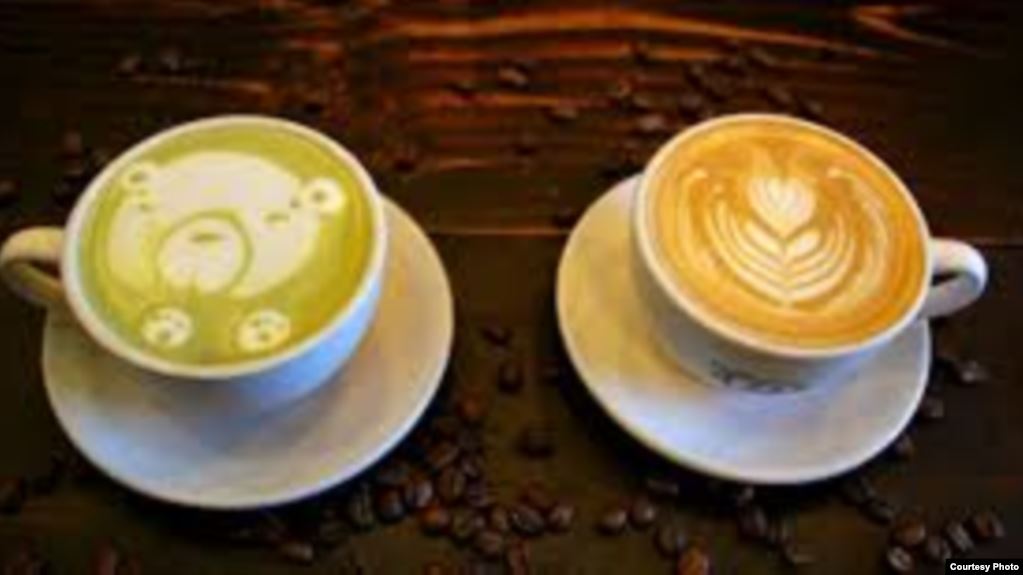پادکست VOA: اصطلاحات انگلیسی – چای یا قهوه؟
سلام با هشتاد وپنجمین قسمت از مجموعه “Words and Their Stories” (کلمات و داستان آن ها) از سری پادکستهای VOA در خدمت شما هستیم. این مجموعه پادکست به توضیح اصطلاحات رایج زبان انگلیسی، داستان ایجاد شدنشون و نحوه استفاده از آن ها در مکالمه می پردازه. در این قسمت از پادکست VOA: اصطلاحات انگلیسی – چای یا قهوه؟ قراره با کاربرد، تاریخچه و معنی اصطلاح “Wake up and smell the coffee” (بیدار شو و بوی قهوه رو استشمام کن!) آشنا بشی. در کنارش چندین اصطلاح و کلمه ی جالب و کاربردی دیگه هم مرتبط با چای و قهوه یاد میگیری که لیست این کلمه ها به همراه معنی اون ها در پایان مطلب قرار گرفته.
اصطلاح “Wake up and smell the coffee” (بیدار شو و بوی قهوه رو استشمام کن!) رو به افرادی میگیم که حاضر نیستن واقعیت رو بپذیرن. “cup of tea” (یه فنجون چای) چیزیه که بهش علاقه زیادی داری. اصطلاح “I wouldn’t do it for all the tea in China” (به خاطر همه چایی های چین هم که شده من این کار رو نخواهم کرد!) رو برای موقعیتی به کار می بری که تخت هیچ شرایطی حاضر نیستی کاری رو انجام بدی.
VOA – Words and Their Stories – 85: Coffee or Tea?

متن انگلیسی پادکست VOA: اصطلاحات انگلیسی – چای یا قهوه؟
Now, the VOA Learning English program Words and Their Stories.
Today we will talk about two of the world’s most popular drinks — coffee and tea.
Now, many people are loyal coffee drinkers. They cannot imagine starting their morning without — what some call — a hot “Cup of Joe.” Some people hate coffee and prefer to drink tea. Others enjoy drinking both!
Whichever you prefer, know that English has some useful expressions using tea and coffee.
Let’s start with things around the home.
The table sitting in the middle of the living room (and usually in front of a sofa) is called a coffee table. We never call it a “tea table.” There is no such thing. Even if you hate the taste of coffee and never set a coffee cup on that table, you would still call it a “coffee table.”
Naturally, a coffee table is the perfect place for a few coffee-table books. These large books usually have beautiful pictures and are meant to entertain people or make an impression on them. They are among the first things visitors see when sitting down in the living room. Many people use them as conversation pieces — you know, items that start people talking about something.
Coffee, as you know, can help you feel more energized. In fact, many people use coffee to wake up in the morning.
Pace the floor, stop and stare
I drink a cup of coffee and start pulling out my hair
I’m drinking forty cups of coffee
Forty cups of coffee
Forty cups of coffee, waiting for you…
[Ella Mae Morse singing “40 Cups of Coffee” from 1953]
And that is where we get the idiom “Wake up and smell the coffee!”
We say this to people who are not accepting a situation as it really is. They are not being realistic. They need to face facts. You can say it to someone or about someone.
If you tea drinkers out there want to stay away from coffee expressions, you can also tell someone to simply “get real” or as we said earlier, “face facts.”
These two are more direct. And while “wake up and smell the coffee” can be used in a lighthearted, funny way, “get real” and “face facts” both sound more serious.
Let’s hear how these expressions can be used.
A: Um, who was at the door?
B: It was Helen.
A: Ugh. Did she ask to move back in with us … again?!
B: Yes. She did.
A: That’s the third time this week!
B: She apologized again for destroying some of the furniture during that party she threw. And she made us something to eat — this cake. She really wants to move back in with us.
A: That woman is unbelievable! Does she have any idea how much damage she did? Our neighbors are still unhappy about that party. Next time she asks to move back in, let me deal with it.
B: What are you going to say to her?
A: I’m going to tell her to wake up and smell the coffee!
B: Uh, I don’t think she drinks coffee.
A: You know what I mean. She needs to face facts. She is never, ever, EVER moving back in with us!
B: But she makes really good cake.
A: Ugh. Get real, Meredith. If you think for one minute that I would live with her just because she makes good cake, then you need to wake up and smell the coffee, too!
B: Mm. Coffee and cake are great together. I’ll start making a pot of coffee now.
A: (sighs) Well … she does make good cake.
Even if you love tea, we just don’t say, “Wake up and smell the tea.” But don’t worry. For all of you tea drinkers, we have a great expression for you!
I like a nice cup of tea in the morning
For to start the day you see
And at half past eleven
Well my idea of heaven
Is a nice cup of tea
[Binnie Hale singing “I Like a Nice Cup of Tea” from 1937]
If you really like something or are really good at something, it is your cup of tea.
But not so fast. That’s not really the way we use today. Yes, many years ago when the expression came into the language it was used in a positive way. But these days we almost always use this expression in a negative way.
So, you don’t say that something is your cup of tea — even if you are talking about your beloved cup of tea.
If something is not your cup of tea, you simply don’t like it or are not good at it. The cup of tea in the expression can mean anything. If you don’t like to go camping, you could say camping is not your cup of tea. If you’re not good at dancing, it is not your cup of tea.
In fact, if you don’t like coffee, you could say it’s not your cup of tea. And actually, that would be a funny way to use this expression.
Now, some places are known for their coffee and others for their tea. For example, Japan and China are famous for their tea. Their tea culture has a long history and tradition. And that is where we get our final expression for today.
Some famous Chinese teas are very pricey. If you gathered all the tea in China, it would be worth a lot of money.
So, if you want to say that you are unwilling to do something … at any cost, you could say, “I wouldn’t do it for all the tea in China.“ For example, if you are deathly afraid of heights, you could say “I would not skydive for all the tea in China.”
This expression is simply an exaggerated, or larger than life way of saying, “No way! I won’t do it! I don’t care what you offer me!”
Okay, we don’t want anyone to accuse us of playing favorites. We already heard a conversation using a popular coffee expression. So, here is a short conversation with the tea expressions we just heard.
A: Tomorrow night I’m going out to a spoken word event. Want to join me?
B: Spoken word? You mean like a poetry reading?
A: Yeah! It’s really awesome.
B: Um … no thanks. Spoken word really isn’t my cup of tea.
A: Oh. So, you probably won’t be interesting in going to a three-day Spoken Word Festival next month.
B: Not for all the tea in China.
A: So … that’s a no?
B: Yes. That’s a big N-O.
And that brings us to the end of this Words and Their Stories.
Choose one of the expressions heard here and try using it. Or share with us a coffee or tea idiom from your language. You can do both in the Comments Section!
I’m Anna Matteo.
Anna Matteo wrote this story for VOA Learning English. George Grow was the editor. The song at the end is The Kinks singing “Have a Cuppa Tea.”
لیست واژگان پادکست VOA: اصطلاحات انگلیسی – چای یا قهوه؟
impression (اثرگذاری)– n. the effect or influence that something or someone has on a person’s thoughts or feelings
positive (مثبت)– adj. good or useful
negative (منفی)– adj. harmful or bad : not wanted
exaggerate (اغراق کردن)– v. to think of or describe something as larger or greater than it really is : to make (something) larger or greater than normal
playing favorites (پارتی بازی کرند)– phrase : to give preferable treatment to someone or something one likes or favors more than others
امیدوارم از پادکست VOA: اصطلاحات انگلیسی – چای یا قهوه؟ لذت برده باشید. برای دسترسی به قسمت های دیگر این پادکست می توانید از صفحه ی پادکست VOA – اصطلاحات انگلیسی آکادمی مجازی آموزش زبان ۲۴talk دیدن کنید.
همچنین برای گوش دادن به پادکست های سطح بندی شده British Council می توانید به صفحه ی پادکست British Council آکادمی مجازی آموزش زبان ۲۴talk یا برای گوش دادن به پادکست های BBC به صفحه ی پادکست ۶ دقیقه انگلیسی (BBC) آکادمی مجازی آموزش زبان ۲۴talk مراجعه کنید.
گوش دادن به پادکست روش خوبی برای تقویت مهارت شنیداری و هم چنین یادگرفتن کلمات در بستر یک موضوع خاصه که این به تقویت مهارت مکالمه انگلیسی نیز کمک زیادی می کنه.
اگه دنبال این هستی که مهارت های مکالمه زبان انگلیسیت رو بیشتر از این تقویت کنی بهت پیشنهاد میکنم در دورهی مکالمه زبان انگلیسی آکادمی مجازی آموزش زبان انگلیسی ۲۴talk شرکت کنی که با یه برنامه منسجم و خلاقانه کمک میکنه در زمان کوتاه بتونی به راحتی و روانی انگلیسی صحبت کنی.







